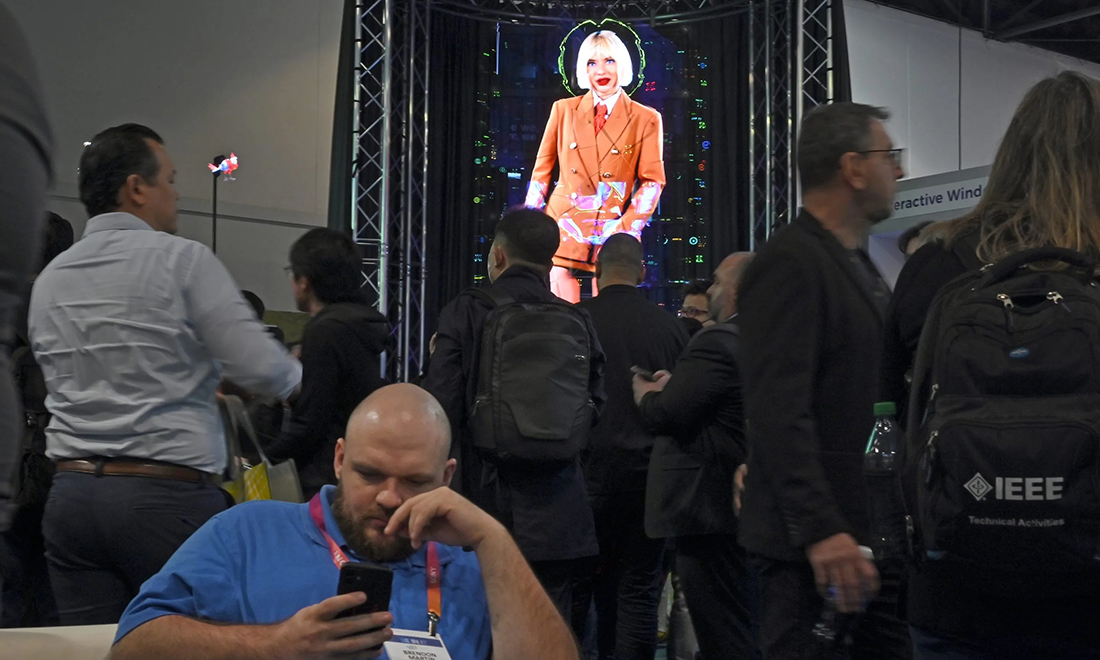
我们正在经历全球信任危机的阵痛。只有十分之二的美国人表示,他们认为政府“总是”或者“大多数情况”会做正确的事情。
事实上,来自28个国家的大多数人称,在看到确切证据之前,他们默认政府是不可信的,在许多民主国家,只有不到一半的公民信任本国政府。
对某些社会群体和边缘人口而言,信任危机并不新鲜,然而危机的扩散却代表了一种令人担忧的趋势,这种趋势源于日益加剧的社会分裂、前所未见的全球挑战和肆意传播的虚假信息。
虽然我是一名乐天派,并且一直是科技的拥护者,但科技在一定程度上加深了人们对政府的不信任。然而,科技也可以帮助解决信任危机。
两种悲观但似乎合理的路径
如今,在多种因素的影响下,许多国家民众对政府的信任度下降。日益加剧的不平等和精英阶层的有罪不罚,动摇了人们对现行制度的信任。“快速行动、打破陈规”的心态和滥用技术进行牟利(压制),加深了这种不信任,甚至引发了政治暴力。虚假信息泛滥,在28个国家超过四分之三的民众说,他们担心虚假新闻被武器化。与此同时,新冠疫情、战争、通胀、气候变化、网络攻击、种族主义和日益严重的威权主义等诸多全球危机,让人们对未来感到担忧。
如果无法处理科技所带来的负面影响,信任就会进一步恶化。在第一种情境下,传统政治制度由于无法解决现有危机而持续衰弱,并且科技加快了现有制度崩溃的速度。
第二种可能是,现有制度继续有效运行,但却是以牺牲个人的自由为代价。政府掌控了由大型集中式网络主导的科技。人与人之间的互动被严密监控,人权受到压制。监控技术的轻松普及,使数字威权主义不断传播。
是否有更好的路径?我认为更好的途径确实存在,但它需要企业密切关注社会信任。
社会信任是商业繁荣的关键
雷切尔·博茨曼将信任定义为“对陌生的人、事、物感到放心的关系”。
在传统社会,信任基于私人关系,始于家庭和部落。超出这些限制,信任度会降低。委内瑞拉是低信任度社会的许多例子之一。委内瑞拉的商业环境因为腐败和制度缺陷而持续恶化。如今,在委内瑞拉的首都加拉格斯,交易谈判或完成交易耗时漫长,成本高昂,困难重重。
繁荣的现代社会需要具有高信任度。政治学家弗朗西斯·福山表示,经济成功的关键在于“自发社交性”,即建立新关系和合作的意愿。在信任度高的社会,你相信出租车司机能够将你送到目的地,或者卖方会履行财产合同。这些社交规范有助于社会高效运行,降低经商成本,并且从长远来看,非常有助于创业和企业发展。
开创美好未来的路径
为了改变当前的轨迹,我们需要利用科技和更明智的治理重建信任。仅靠科技的自我修复或单纯依靠监管措施,都无法实现这个目标。我们也不能等待分布式个人网络从自上而下的集中式系统中夺回科技的控制权。相反,我们需要更好的平衡各种方法,包括开展公私合作。
对企业而言,专注于如何运用客户和其他利益相关者的信任依旧重要,但我们也需要关注社会信任。企业了解自身行动较深层次的动力,关注外部的信任度,就可以做出更好的决策,并且有助于修复社会信任。
当人们认为政府能够言出必行并且做正确的事情时,就可以建立信任。
虽然我们很难避免最新争议的干扰,但我们应该关注的是如何完善现有制度,而不是只看问题。我们能够从全球与数字民主有关的倡议中获得启发。当人们感觉游戏规则清晰、公平和执行得力时,他们就更有可能相信游戏结果。
在混乱和危险的时期,首先我们需要将信任作为一种共同价值观,并以此为基础进行技术创新。(财富中文网)
本文作者彼得·施瓦茨(Peter Schwartz)现任赛富时(Salesforce)的首席未来官和负责战略规划的高级副总裁。
Fortune.com上发表的评论文章中表达的观点,仅代表作者本人的观点,不代表《财富》杂志的观点和立场。
译者:刘进龙
审校:汪皓
我们正在经历全球信任危机的阵痛。只有十分之二的美国人表示,他们认为政府“总是”或者“大多数情况”会做正确的事情。
事实上,来自28个国家的大多数人称,在看到确切证据之前,他们默认政府是不可信的,在许多民主国家,只有不到一半的公民信任本国政府。
对某些社会群体和边缘人口而言,信任危机并不新鲜,然而危机的扩散却代表了一种令人担忧的趋势,这种趋势源于日益加剧的社会分裂、前所未见的全球挑战和肆意传播的虚假信息。
虽然我是一名乐天派,并且一直是科技的拥护者,但科技在一定程度上加深了人们对政府的不信任。然而,科技也可以帮助解决信任危机。
两种悲观但似乎合理的路径
如今,在多种因素的影响下,许多国家民众对政府的信任度下降。日益加剧的不平等和精英阶层的有罪不罚,动摇了人们对现行制度的信任。“快速行动、打破陈规”的心态和滥用技术进行牟利(压制),加深了这种不信任,甚至引发了政治暴力。虚假信息泛滥,在28个国家超过四分之三的民众说,他们担心虚假新闻被武器化。与此同时,新冠疫情、战争、通胀、气候变化、网络攻击、种族主义和日益严重的威权主义等诸多全球危机,让人们对未来感到担忧。
如果无法处理科技所带来的负面影响,信任就会进一步恶化。在第一种情境下,传统政治制度由于无法解决现有危机而持续衰弱,并且科技加快了现有制度崩溃的速度。
第二种可能是,现有制度继续有效运行,但却是以牺牲个人的自由为代价。政府掌控了由大型集中式网络主导的科技。人与人之间的互动被严密监控,人权受到压制。监控技术的轻松普及,使数字威权主义不断传播。
是否有更好的路径?我认为更好的途径确实存在,但它需要企业密切关注社会信任。
社会信任是商业繁荣的关键
雷切尔·博茨曼将信任定义为“对陌生的人、事、物感到放心的关系”。
在传统社会,信任基于私人关系,始于家庭和部落。超出这些限制,信任度会降低。委内瑞拉是低信任度社会的许多例子之一。委内瑞拉的商业环境因为腐败和制度缺陷而持续恶化。如今,在委内瑞拉的首都加拉格斯,交易谈判或完成交易耗时漫长,成本高昂,困难重重。
繁荣的现代社会需要具有高信任度。政治学家弗朗西斯·福山表示,经济成功的关键在于“自发社交性”,即建立新关系和合作的意愿。在信任度高的社会,你相信出租车司机能够将你送到目的地,或者卖方会履行财产合同。这些社交规范有助于社会高效运行,降低经商成本,并且从长远来看,非常有助于创业和企业发展。
开创美好未来的路径
为了改变当前的轨迹,我们需要利用科技和更明智的治理重建信任。仅靠科技的自我修复或单纯依靠监管措施,都无法实现这个目标。我们也不能等待分布式个人网络从自上而下的集中式系统中夺回科技的控制权。相反,我们需要更好的平衡各种方法,包括开展公私合作。
对企业而言,专注于如何运用客户和其他利益相关者的信任依旧重要,但我们也需要关注社会信任。企业了解自身行动较深层次的动力,关注外部的信任度,就可以做出更好的决策,并且有助于修复社会信任。
当人们认为政府能够言出必行并且做正确的事情时,就可以建立信任。
虽然我们很难避免最新争议的干扰,但我们应该关注的是如何完善现有制度,而不是只看问题。我们能够从全球与数字民主有关的倡议中获得启发。当人们感觉游戏规则清晰、公平和执行得力时,他们就更有可能相信游戏结果。
在混乱和危险的时期,首先我们需要将信任作为一种共同价值观,并以此为基础进行技术创新。(财富中文网)
本文作者彼得·施瓦茨(Peter Schwartz)现任赛富时(Salesforce)的首席未来官和负责战略规划的高级副总裁。
Fortune.com上发表的评论文章中表达的观点,仅代表作者本人的观点,不代表《财富》杂志的观点和立场。
译者:刘进龙
审校:汪皓
We are in the throes of a global trust crisis. Only two in 10 Americans say they believe the government will do the right thing “just about always” or “most of the time.”
In fact, a majority of people across 28 countries say their default is to distrust until they see proof–and less than half of citizens in many democracies trust their institutions.
For some societies and marginalized populations, the trust crisis is nothing new–but its expansion represents a troubling trend, one stemming from rising societal divisions, unprecedented global challenges, and the rampant spread of misinformation.
While I’m an optimist who has long championed technology, it, too, has played a role in deepening distrust. However, technology can also help resolve the trust crisis.
Two pessimistic but plausible paths
Today, a confluence of forces is causing trust levels to decline across many countries. Rising inequality and impunity among elites have shaken faith in established systems. The “move fast and break things” mentality and the misuse of technology for profit (or repression) have deepened mistrust and even contributed to political violence. Misinformation has exploded, with more than three in four people in 28 countries reporting that they worry about the weaponization of fake news. Meanwhile, a plethora of global crises–the pandemic, war, inflation, climate change, cyberattacks, racism, and growing authoritarianism–have sown fear of the future.
If we can’t get a handle on the negative forces that technology has unleashed, trust will continue to deteriorate. In one scenario, traditional institutions keep declining as they fail to address the current crisis, and technology accelerates the demise of established systems.
A second possibility is that institutions remain effective, but at a cost to personal freedom. Governments seize control of technology, which is dominated by large, centralized networks. Interactions are highly monitored and rights are repressed. Easy access to surveillance technology allows digital authoritarianism to spread.
Is there a better path? I think there is one, but it will require businesses to pay closer attention to societal trust.
Societal trust is critical to business prosperity
Rachel Botsman defines trust as “a confident relationship with the unknown.”
In traditional societies, trust was based on personal relationships, starting with family and tribe. Beyond those limits, trust was low. Venezuela is one of many examples of a low-trust environment where the business climate has deteriorated due to corruption and institutional weakness. Today in Caracas, negotiating deals or completing transactions is slow, costly, and difficult.
A prosperous, modern society requires high levels of trust. Political scientist Francis Fukuyama noted that “spontaneous sociability”–the willingness to form new associations and cooperate–is key to economic success. In a high-trust society, you have faith that a cab driver will get you to your destination, or a seller will honor a property contract. These norms help society function efficiently, lower the cost of doing business, and, over time, make a significant contribution to business formation and growth.
A path to a better future
To change our current trajectory, we need to leverage both technology and smarter governance to rebuild trust. Relying on technology to fix itself or regulatory action alone won’t get us there. Neither will waiting for distributed networks of individuals to reclaim control of technology from top-down, centralized systems. Instead, we need a better balance of approaches, including cooperation between the public and private sectors.
For businesses, it remains important to focus on how we operationalize trust with customers and other stakeholders, but we also need to focus on societal trust. By understanding the deeper dynamics of our own efforts and paying attention to how trust is experienced outside our walls, businesses can make better decisions and contribute to repairing trust in the societies in which we operate.
Trust is built when people perceive that institutions not only do what they say they will–but also do the right thing.
And while it can be difficult to avoid the distractions of the latest controversy, we should focus on fixing institutions, not just issues. For inspiration, look at the initiatives emerging around digital democracy across the world. When people feel that the rules of the game are clear, fair, and enforced, they’re far more likely to trust the results.
In chaotic and dangerous times, we need technological innovation that’s grounded in trust as a shared value from the get-go.
Peter Schwartz is Salesforce’s Chief Futures Officer and SVP of strategic planning.
The opinions expressed in Fortune.com commentary pieces are solely the views of their authors and do not necessarily reflect the opinions and beliefs of Fortune.






